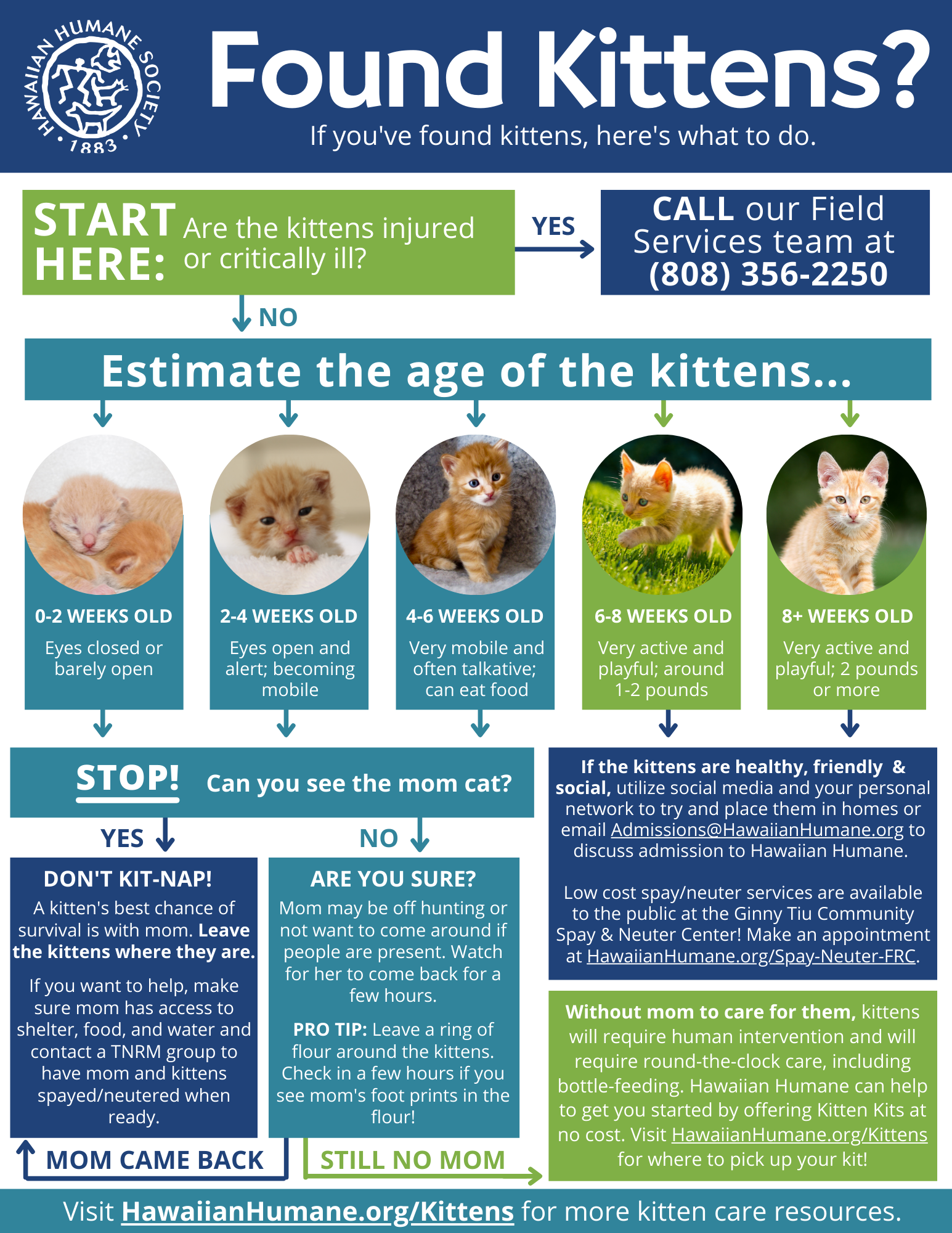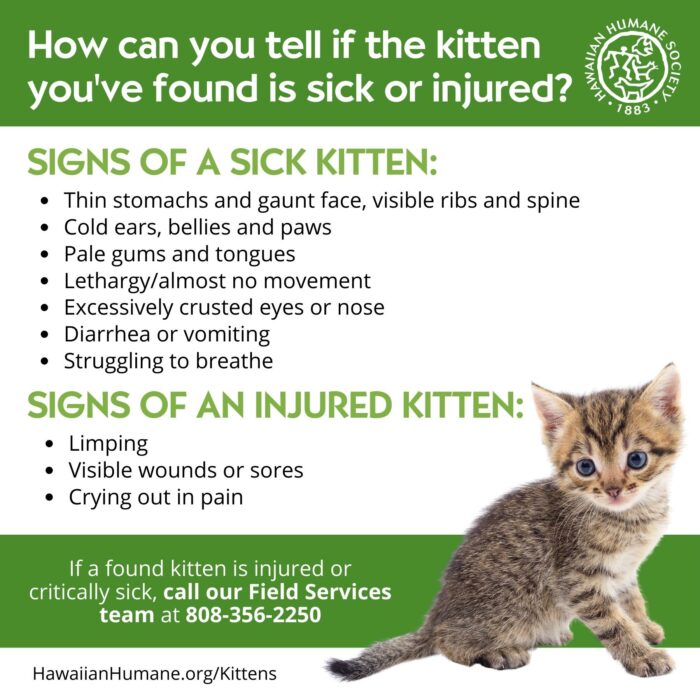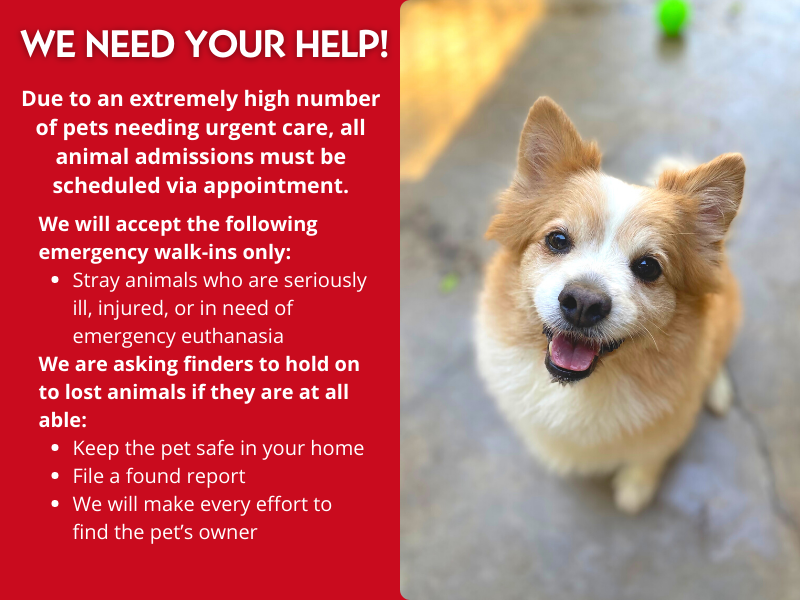
It takes a village to support the hundreds of abandoned neonate kittens that come to us in need of round-the-clock care every year. Being so young with low immune systems means these kittens are exceptionally vulnerable. Keeping them separate from our general shelter population and providing them with a safe, secure environment as they grow is critically important, which is why neonate fosters are so crucial. Hawaiian Humane provides all of the training, supplies and veterinary care for our fosters – we just need YOU and the gift of your time and compassion! There are so many ways to make a lifesaving difference today:
- Join our trained force of neonate foster volunteers that we affectionately call the Itty Bitty Kitty Committee!
- Donate much-needed supplies to our Kitten Shower registry!
Kitten FAQ
“Kitten Season” refers to a time of year where Free-Roaming cats start reproducing and continue to have several litters. In most states, Kitten Season begins around spring and lasts through early winter. However, in Hawaiʻi, Kitten Season can last almost year-round due to our warmer climate. During this time, Hawaiian Humane, and animal welfare organizations nationwide, experience a massive influx of kittens and mother cats admitted to the shelter.
Did you know…
Kitten season is the time of year when female cats are most likely to go into heat, and they give birth to the most litters of kittens. Female cats can go into heat as early as four months old. Data shows that a female cat is able to have over 100 kittens during her reproductive years.
Not all kittens need help. A kitten’s best chance of survival is when they are with their mother, so before you scoop up kittens you find outdoors, it is important to determine if they’re truly orphans or if mom is just hiding or hunting nearby.
- Quietly observe from a distance to determine if the mother is present.
- If the kittens are clean and sleeping in a heap, mom is most likely out hunting and will be back to care for them.
- If you sense the kittens are in immediate danger, move them to a safe area nearby where mom can still find them. Place them in a sheltered area, away from direct sun, rain or traffic and continue to watch for the mother.
- If you have observed the kittens for 12 to 24 hours and the mother has not returned, then pick them up and care for them.
If mom is nearby or returns, let her be the one to care for them until they are 8 weeks old.
Follow the chart below to determine what to do next:

Provide care in your home until they are 8 weeks old. If mom has truly not returned after several hours, newborn kittens will require human intervention and round-the-clock care, including bottle-feeding and more.
At the Hawaiian Humane Society, we understand that finding kittens can be both exciting and overwhelming. We offer two supportive options for community members who discover kittens in need: Kitten Kits and our Finder Foster program.
Kitten Kits
Free supplies to help you care for found kittens independently
When you find kittens and want to care for them entirely on your own, our Kitten Kits serve as a starter kit to help you get started. By choosing this option:
- You maintain full ownership of the kittens
- You handle all aspects of their care and future placement
- You receive a free Kitten Kit to support their healthy development, including supplies based on their age
Hawaiian Humane Neonate Kitten Kits include:
- 12oz can of KMR (Kitten Formula)
- Nursing bottle, extra nipples & a bottle brush
- 2-3cc oral syringes (for syringe feeding neonates)
- 2-Miracle Nipples (a special attachment)
- 2-cans of wet kitten food
- Cardboard carrier (for transport)
- Hand Warmers and Hand Towel (to keep them cozy)
- Training Resource: Orphan Kittens Booklet, Kitten Care and FAQ Video / What’s Next Handout
- Home to Home Brochure
Hawaiian Humane Weaned Kitten Kits include:
- Pet Taxi (as needed)
- 3 cans of wet food per kitten
- 1 sandwich size bag of kitten dry food
- 1 litter box
- 1 gallon size bag of litter pellets
- 2 toys
- Training Resources: Kitten Care and FAQ Video / What’s Next Handout
- Home to Home Brochure
Our Kitten Kits are designed to empower you to provide compassionate care outside the shelter system.
Pick up locations for Kitten Kits:
Hawaiian Humane Society Mōʻiliʻili Campus – Dr. Norman & Kazue Ueda and Peppy Pet Kōkua Center (Admissions)
Daily, 11 am – 6 pm
Hawaiian Humane Society Kosasa Family Campus at Hoʻopili – Ginny Tiu Pet Kōkua Resource Center (Admissions)
Wednesday – Sunday, 11 am – 6 pm
Hawaiian Humane Society Field Service Officers and Animal Protection Officers on the road, islandwide
Finder Foster Program
Support for those who need additional guidance
If you’ve found healthy kittens under 8 weeks old but need extra support with their care, our Finder Foster program may be the right option. Here’s how it works:
- Kittens are surrendered to Hawaiian Humane’s ownership
- You can typically take them home that same day
- Our Foster Care & Veterinary Services teams provide direction and support
- We provide all medical care and necessary supplies (food, toys, snuggle safes, etc.)
Eligibility Process:
- Kittens must be under 8 weeks old and assessed by our Admissions Department
- Staff determines if they qualify for the Finder Foster program
- If needed, kittens may receive further medical examination to determine appropriate next steps
By participating in our Finder Foster program, you’re giving vulnerable kittens the specialized care they need while freeing up valuable shelter space for other animals.
Choosing What’s Right for You
We encourage community members to consider caring for found kittens independently with our Kitten Kits whenever possible, as this helps more animals stay out of the shelter system. However, we understand that additional support is sometimes needed, which is why we offer the Finder Foster option for those situations.
Other great resources to understand how to feed orphaned kittens:
- Kitten Lady
As Oʻahu’s largest animal welfare organization, the Hawaiian Humane Society accepts all pet animals in need of shelter and care. However, newborn kittens less than eight weeks old are at high risk when brought into the shelter environment. Due to the large number of animals housed at animal shelters, underage kittens are some of the most vulnerable and susceptible to diseases that can spread quickly and can often be fatal.
Underage kittens require round-the-clock care with constant monitoring and feedings that are not best met by the shelter setting. Though we make every effort to provide lifesaving measures for each animal brought to us, like shelters across the country, Hawaiian Humane cannot guarantee that a pet will be fostered, transferred or adopted. We ask for our community’s support in providing care for vulnerable animals until they are ready for spay/neuter surgery and adoption.
If the kittens are healthy, friendly and social, utilize social media and your personal network to try and place them in homes or email Admissions@HawaiianHumane.org to discuss admission to Hawaiian Humane.
Contact a TNRM group or make an appointment for low-cost spay/neuter services at the Ginny Tiu Community Spay/Neuter Center. CLICK HERE to schedule an appointment today. If mom is present, be sure to have her spayed too in order to prevent future litters.
Additional Resources
Trap-Neuter-Release-Manage (TNRM) Resources
Low-fee Spay/Neuter and Vaccination Resources
- Ginny Tiu Community Spay/Neuter Center at Hawaiian Humane
- Contact your local veterinarian
Other Ways to Support Kittens and Animals in our Community
- Become a Foster Volunteer
- Donate goods
- Give a monetary gift to support their care at Hawaiian Humane
- Become a Hawaiian Humane Volunteer
- Adopt!


